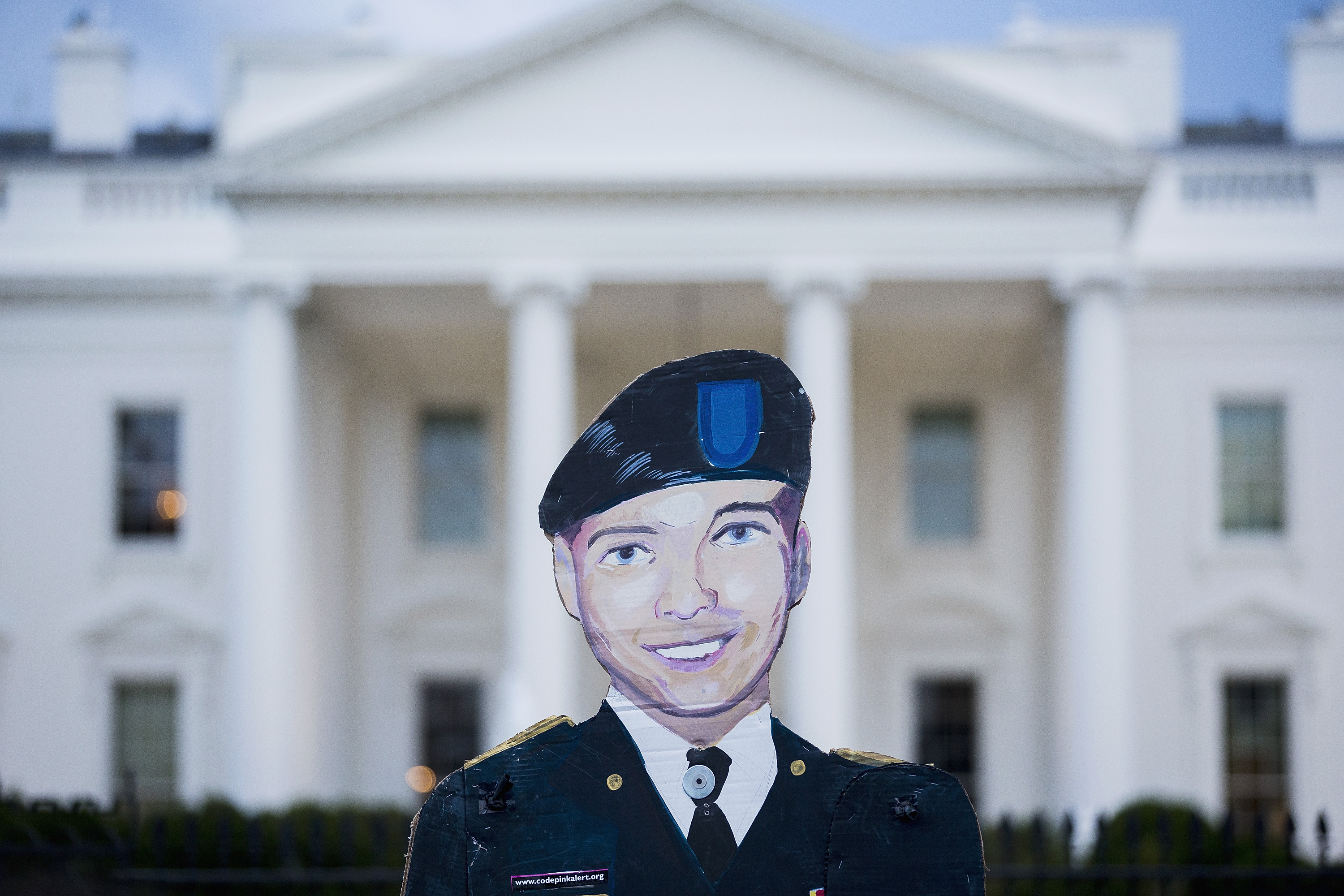Why Obama commuted Chelsea Manning's sentence
His clemency for Chelsea Manning holds a message for Trump's America


"The quality of mercy is not strained; it droppeth as the gentle rain from heaven," Portia famously tells Shylock, who is demanding a pound of flesh from her friend Antonio in William Shakespeare's The Merchant of Venice. "It is twice blest; It blesseth him that gives and him that takes. 'Tis mightiest in the mightiest; it becomes the throned monarch better than his crown."
That's one way of looking at President Obama's decision on Tuesday to commute the sentence of Chelsea Manning, the Army private serving 35 years for stealing classified U.S. military files and diplomatic cables and leaking them to WikiLeaks, throwing a wrench into Obama's first term. The drafters of the Constitution, after all, made clemency one of the president's few absolute powers, checked only by public opinion.
The commutation was met with a mix of praise and harsh condemnation. Human Rights Watch's Maria McFarland Sanchez-Moreno called Manning's sentence "grossly disproportionate," and said it had "a chilling effect" on "other whistleblowers who might have information about abuses, human rights violations, fraud, corruption to disclose." House Speaker Paul Ryan (R-Wis.) blasted the shortening of Manning's sentence as "outrageous," arguing that "Obama now leaves in place a dangerous precedent that those who compromise our national security won't be held accountable for their crimes."
The Week
Escape your echo chamber. Get the facts behind the news, plus analysis from multiple perspectives.

Sign up for The Week's Free Newsletters
From our morning news briefing to a weekly Good News Newsletter, get the best of The Week delivered directly to your inbox.
From our morning news briefing to a weekly Good News Newsletter, get the best of The Week delivered directly to your inbox.
Why, exactly, did Obama do it?
Maybe he decided that mercy was the appropriate response for a suicidal transgender woman stuck in a male military prison, and for the military justice system that would have to handle Manning's desire to medically transition from man to woman. With Tuesday's acts of clemency, Obama wanted to show that the U.S. is a "forgiving nation, where hard work and a commitment to rehabilitation can lead to a second chance," White House Counsel Neil Eggleston said in a statement. Last Friday, White House Press Secretary Josh Earnest noted that Manning had admitted to her actions, expressed remorse for them, and submitted herself to military justice.
Or perhaps Obama decided seven years in prison was punishment enough for embarrassing him and the United States, scrambling America's diplomatic ties, endangering foreign collaborators, exposing war logs from Iraq and Afghanistan, and raising the profile of WikiLeaks and its founder, Julian Assange. Manning's lawyers, human rights groups, and even senior White House officials note that 35 years is a much more severe sentence that those doled out in comparable cases. "Manning's sentence was orders of magnitude greater than any sentence previously imposed for leaking classified information to the media," said Elizabeth Goitein at the Brennan Center for Justice.
Obama may have been "motivated by humanitarian considerations" or a debt of gratitude to his LGBT supporters, CNN's Stephen Collinson suggests, or "he may also have reasoned that with President-elect Donald Trump about to take office, the chances of Manning winning release for years to come were slim." Alternately, Obama may now believe that his strident campaign to prosecute Americans who leaked classified information was excessive, said Steven Aftergood at the Federation of American Scientists, and this "final set of actions" is "a signal to the system that prosecutors have gone too far."
A free daily email with the biggest news stories of the day – and the best features from TheWeek.com
Obama will give his own explanation for what CNN calls "one of the most controversial moments of his tenure" at his final presidential press conference on Wednesday. But, whatever reasons he gives, it would be a mistake to take the Manning commutation as an isolated event. And it wouldn't be too much of a stretch to see this as part of Obama's last-minute push to "baby-proof America before Trump takes over," in The Daily Show's arch phraseology.
Remember, Obama also commuted the sentences of 208 other people on Tuesday and granted full pardons to another 64. Obama has been stingy with his pardons — his total, 212, is historically low — though his 1,385 commutations have set a presidential record, beating Woodrow Wilson's 1,366. The commutations have mostly gone to nonviolent drug offenders and the pardons run the gamut, but Tuesday's most high-profile pardon was given to former Marine Corps Gen. James Cartwright.
Cartwright, who was vice-chairman of Obama's Joint Chiefs of Staff until retiring in 2011, pleaded guilty in October to misleading the FBI about conversations with a journalist on a U.S.-Israeli cyber-warfare operation targeting Iran's nuclear reactors. He had been scheduled to be sentenced later this month. David Sanger, the New York Times reporter with whom Cartwright spoke about the Iran cyberattack, said that he'd had "many sources" on his story, and Cartwright had "showed concern that information damaging to U.S. interests not be made public." As a general rule, Sanger asserted, "leak investigations have the effect of making people less willing to talk, and the result is often a loss for our democracy."
Taken together, the Cartwright and Manning clemencies do appear to be sending a message.
By granting clemency to people who, at least in their own minds, tried to inform the public about what the government is doing in secret, Obama reminds America of sunlight's power to disinfect, right before a historically opaque president takes over. Did Obama live up to his vow to run the "most transparent administration in history"? Not exactly, or at least not on purpose. But the Trump administration promises to be something else entirely.
So maybe pardoning Cartwright and commuting Manning's sentence is Obama's way of encouraging civil servants and people with access to blow the whistle on Trump like their country depended on it, even as his own administration prosecuted those who leaked national security secrets.
Or, maybe Obama just agrees with Shakespeare on the merits of leaders raining clemency down on those to whom justice has been disproportionately rendered.
The quality of mercy is not strained,It droppeth as the gentle rain from heavenUpon the place beneath: it is twice blest;It blesseth him that gives and him that takes:'Tis mightiest in the mightiest: it becomesThe throned monarch better than his crown;His sceptre shows the force of temporal power,The attribute to awe and majesty,Wherein doth sit the dread and fear of kings;But mercy is above this sceptred sway;It is enthroned in the hearts of kings,It is an attribute to God himself;And earthly power doth then show likest God'sWhen mercy seasons justice.[Shakespeare, The Merchant of Venice, Act IV, Scene 1]
Peter has worked as a news and culture writer and editor at The Week since the site's launch in 2008. He covers politics, world affairs, religion and cultural currents. His journalism career began as a copy editor at a financial newswire and has included editorial positions at The New York Times Magazine, Facts on File, and Oregon State University.
-
 What the new Making Tax Digital rules mean
What the new Making Tax Digital rules meanThe Explainer A new system will be introduced from April to overhaul how untaxed income is reported to HMRC
-
 The former largest iceberg is turning blue. It’s a bad sign.
The former largest iceberg is turning blue. It’s a bad sign.Under the radar It is quickly melting away
-
 Why Saudi Arabia is muscling in on the world of anime
Why Saudi Arabia is muscling in on the world of animeUnder the Radar The anime industry is the latest focus of the kingdom’s ‘soft power’ portfolio
-
 The billionaires’ wealth tax: a catastrophe for California?
The billionaires’ wealth tax: a catastrophe for California?Talking Point Peter Thiel and Larry Page preparing to change state residency
-
 Bari Weiss’ ‘60 Minutes’ scandal is about more than one report
Bari Weiss’ ‘60 Minutes’ scandal is about more than one reportIN THE SPOTLIGHT By blocking an approved segment on a controversial prison holding US deportees in El Salvador, the editor-in-chief of CBS News has become the main story
-
 Has Zohran Mamdani shown the Democrats how to win again?
Has Zohran Mamdani shown the Democrats how to win again?Today’s Big Question New York City mayoral election touted as victory for left-wing populists but moderate centrist wins elsewhere present more complex path for Democratic Party
-
 Millions turn out for anti-Trump ‘No Kings’ rallies
Millions turn out for anti-Trump ‘No Kings’ ralliesSpeed Read An estimated 7 million people participated, 2 million more than at the first ‘No Kings’ protest in June
-
 Ghislaine Maxwell: angling for a Trump pardon
Ghislaine Maxwell: angling for a Trump pardonTalking Point Convicted sex trafficker's testimony could shed new light on president's links to Jeffrey Epstein
-
 The last words and final moments of 40 presidents
The last words and final moments of 40 presidentsThe Explainer Some are eloquent quotes worthy of the holders of the highest office in the nation, and others... aren't
-
 The JFK files: the truth at last?
The JFK files: the truth at last?In The Spotlight More than 64,000 previously classified documents relating the 1963 assassination of John F. Kennedy have been released by the Trump administration
-
 'Seriously, not literally': how should the world take Donald Trump?
'Seriously, not literally': how should the world take Donald Trump?Today's big question White House rhetoric and reality look likely to become increasingly blurred
